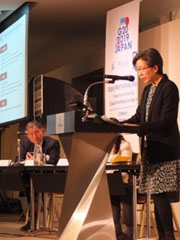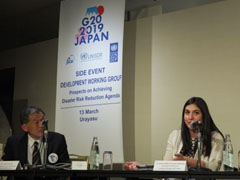March 13, 2019
On Wednesday, March 13, 2019, the JICA Disaster Risk Reduction Group co organized a side-event, namely, the "Prospects of Achieving Disaster Risk Reduction Agenda" of the G20 Development Working Group (DWG), meeting with representatives from the Ministry of Foreign Affairs of Japan (MOFA), the United Nations Development Programme (UNDP), and the United Nations International Strategy for Disaster Reduction (UNISDR, currently UNDRR).
This side event confirmed the consistency among the "Sendai Framework for Disaster Risk Reduction 2015 2030" adopted on March 18, 2015 at the 3rd UN World Conference on Disaster Risk Reduction, the Sustainable Development Goals (SDGs) adopted on September 25, 2015, and the Paris Agreement enforced on November 4, 2016, and discussed the issues to be addressed by the G20 countries and international organizations to achieve the agenda relative to DRR. Multiple efforts to DRR, the importance of pre disaster investment in DRR, and the importance of the "Build Back Better" concept were confirmed and summarized as a chairperson's summary. This is expected to be used as a key message in the Leaders' Declaration at the G20 Osaka Summit (June 2019), and is also expected to be used in future discussions at the United Nations Global Platform for Disaster Risk Reduction (May 2019) and TICAD7 (August 2019).
The side events organized by JICA consisted of Session 1, "Multiple Efforts on Disaster Risk Reduction;" Session 2, "Importance of Disaster Risk Reduction Investment and Build Back Better;" and Session 3, "Achievements for Global Target (e) of the Sendai Framework for Disaster Risk Reduction." Ms. Muto, Director General of the Global Environment Department of JICA as panelist, and Mr. Takeya, Distinguished Technical Adviser to the President of JICA as moderator, took the stage, and Mr. Widaja, Deputy Minister, National Disaster Management Authority of Indonesia (BNPB), Ms. Aguilar, Director of International Strategies for Risk Reduction, National Service of Risk and Emergency Management of Ecuador (SNGRE), and Dr. Quan, Deputy Director of the Department of Science Technology and International Cooperation, Vietnam Disaster Management Authority (VNDMA) also presented examples of their efforts and of JICA's support.
Session 3 focused on the "Sendai Framework for Disaster Risk Reduction, Global Target (e)," namely, "Substantially increase the number of countries with national and local disaster risk reduction strategies by 2020." There was an active discussion on the three (3) issues, i.e., leadership, capacity and budget, which are necessary to achieve the Global Target (e) as envisioned by each panelist.

Session 3 (Ms. Muto, Director General of Global Environment Department of JICA presenting JICA's cooperation for DRR, and Mr. Takeya, Distinguished Technical Adviser to the President of JICA playing the role as moderator)

Session 3 (Mr. Takeya and Ms. Aguilar from Ecuador discussing issues and solutions for the Global Target (e))
Ms. Aguilar gave an outline of the country's DRR plan and the efforts made under the JICA's technical cooperation project. In Ecuador, there was a city level "DRR agenda" equivalent to the disaster risk reduction plan in Japan, although its content dealt merely with the response at the time of disaster. JICA's technical cooperation project, which started after the great earthquake in 2016, analyzed the local risks, incorporating knowledge from Japanese experts for three cities having particularly high earthquake and tsunami risks, and supported formulation of the "Agenda on Disaster Risk Reduction from Earthquake and Tsunami" upon reviewing the policies, priority matters and pre disaster investment plans and investments. SNGRE also developed the "Guideline for Developing Disaster Risk Reduction Plans on Earthquake and Tsunami," and intends to expand the effort to develop DRR plans to other cities in Ecuador, together with the preceding three cities.
A few days before this session, there were heavy floods in central and southern Ecuador due to the torrential rains. Ms. Aguilar said "We need to understand the risks from floods and landslides, and to think seriously about the formulation of a drastic DRR plan. Participation in this session is a very meaningful opportunity for us to open up new horizons, including site visits."
Since the elements of the Guideline developed by this technical cooperation project are common to DRR planning for other disaster types, it is expected that the concept of Global Target (e) will lead to the strengthening of a comprehensive DRR management and the promotion of pre disaster investments. Through this side-event, JICA delivered once again to all the participants, including the presenters, a message about the importance of formulating local DRR plans and pre disaster investment after the formulation of plans.
JICA will continue to capture opportunities for international conferences, such as the "Global Platform for Disaster Risk Reduction," and to deliver a message about the efforts to achieve the "Sendai Framework for Disaster Risk Reduction."
Reference link




scroll